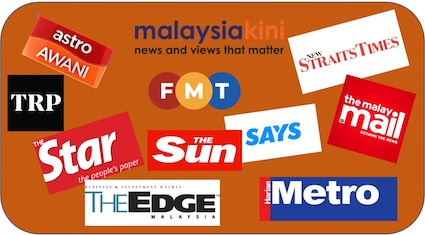How much integrity exists within the Malaysian Media?

Murray Hunter
The appointment of prominent media figure and journalist Wong Chun Wai as chairman of the government owned media organization Bernama, has come with some controversy. Wong was seen as a propagandist during his tenure at The Star. As an advisor to the Malaysian Anti-Corruption Commission, Wong was in close proximity to corruption. Wong’s new role will be involved in orchestrating narratives, which will be picked up by other media outlets across the country.
This brings up the question about how much integrity today, exists within Malaysian online news portals?
Online news portals developed out of the 1998 ‘reformasi’ movement, when Harakah, and later ‘Free Anwar’ (now defunct) became the mouthpieces of the opposition politics. In 1999, Malaysiakini was formed taking a pro-opposition editorial line, and bringing investigative journalism to the country’s media. Malaysiakini was the pioneer of what became known as the alternative media.
Malaysia’s media has undergone radical change over the last decade. The government media has lost much of the direct influence that it had, where now most “news” is disseminated by a large and fragmented sea of on-line news portals. Today, the majority of Malaysians actually pick up their news through mobile phone chat groups, where news portal articles are shared.
The definition of ‘news’, would refer to reports, and Op Eds which are the most popular type of articles read today for the ‘politically aware’ public.
Issues interfering with media integrity today
There are a wide range of issues that infringe upon open, honest and factual reporting and analysis in the Malaysian media today.
Institutional restrictions
Over the last few months, a number of news portals have been spasmodically blocked through internet service providers. These news portals like Malaysia Now run articles critical towards government decisions and actions.
Online news portals have found it frustrating, as they have not infringed or broken any laws or government guidelines. Malaysian Communications and Multimedia Corporation (MCMC) denies blocking any news portal sites, making blockage issues almost impossible to rectify.
In addition, government linked corporations (GLCs) are filing letters of demand (LOD) for alleged defamation to any news portal and journalists who report on their activities, usually those involved in government land grabs. News portals and journalists usually end up in agreements, where they cannot report on the corporation’s activities. Due to shoe-string budgets and poor financial resources of these news portals, they have little choice but comply. This is becoming a widespread method to silence media criticism.
Local news portals are very cooperative with the executive government. Ministers through their political or media secretaries liaise with news portals to request the removal of content they disagree with. Its not uncommon to see articles taken down soon after they are posted, without much question by the editors.
Self-censorship
As a consequence, news portals in Malaysia are very conservative, and practice prudent self-censorship to keep them away from any issues with authorities and legal suits.
This has stalled investigative journalism in Malaysia, as a defamation award against a journalist could range between RM250-350K, and lead to bankruptcy. Self-censorship has turned most local news portals into outlets that use articles from the state run media Bernama, press releases, reports from government press conferences, and other news in an uncritical manner. News portals have more latitude on issues that don’t ruffle the sensitivities of the government.

